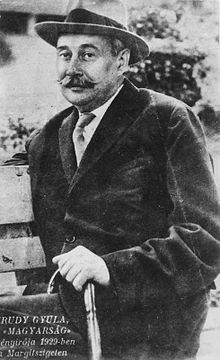
Similar to the entire Hungarian literature, it took me a long time, way too much time, to reach that delightful, albeit with a dash of fusty prose. I still remember my exaltation with the little book "Niki: The Story of a Dog" by Tibor Déry which I came across whilst still at school. It was first published in Polish by Jerzy Giedroyc i, 1959. My next significant encounter with that literature had to wait until Kertész's Noble Prize in 2002. Then the floodgates opened ... Péter Esterházy's "Harmonia caelestis", László Krasznahorkai but primarily the works of Sándor Márai which were systematically translated (by Teresa Worowska, Irena Makarewicz and the now deceased Feliks Netz) and published.
And it was Márai, and his book "Sindbad is returning home" to be precise, translated by Worowska and published in Czytelnik in 2008, which introduced me to the works of Gyula Krúdy. Márai used the style of his favourite author to write a novel about him. After all, the titular Sindbad is none other than the prosaist himself, author of numerous novels, short stories, editorials and articles who passed away in 1933. His claim to fame came in 1911 in the form of "Sindbad's Youth". Márai published his "Sinbad ..." in 1941 where he depicted an imaginary yet not unreasonable last day in the life of the 55 year old writer, whom he considered to be his maestro. And he was not the only one. From Elżbieta Cegielska's forward to "The city of dormant women" I found out that – according to calculations by Lajos Grendel, a contemporary historian of literature – eight out of ten Hungarian writers love Krúdy. And there is ample reason to do so. Nobody wrote about his native Land of Birches, or Nyírség like him, "where - as he fell into lyricism - air, sand, wind, water and meadows have such a charm that everyone becomes a Hungarian over Hungary, even if they had a father who did not even speak Hungarian". Krúdy did speak it, even though his family situation was complicated. His father (also Gyula), who came from a wealthy noble family, had an affair with his maid, she became pregnant, the lady threw her out of the door, the honourable young man followed her and years later, as a lawyer, married the mother of - pat attention now! - his ten children. The future author of "Sinbad's Youth" was 17 years old at the time and, following in the footsteps of his father, he also stood up to his father. And he, in turn, married a rabbi's daughter and gave up the legal studies his father had dreamed of in order to professionally devote himself to writing. His father disinherited him, but the boy was ambitious and undoubtedly talented, which does not change the fact that he had a hard life, because the newspaper poems were not sweet, and he did not have a knack for money, because he was a real loser, he had a very discerning palate (and he was probably also a glutton), an even bigger drunkard, a womaniser, and above all a social man and, as we would say today, a born reporter, who, however, could give a deeper dimension to even the simplest story. In any case, unfortunately, the family life of the author of "The city of dormant women" did not succeed with either the first or the second wife. In 1897 he moved to Pest, which he did not leave until his death. Most of his Sinbad's travels are phantasmagorical. And Krúdy himself travels, and how, from café to restaurant, from hotel to wine bar, from club to editorial office, where he patiently waits for miserable remuneration. Thinking about the women he wrote about, as Bruno Schulz did, with whom he is often compared, with a real obsession when it came to female knees. And because of the way in which Kertész sometimes uses time, among other things, he is often compared to Kafka and Proust. But pay no heed to these analogies. That prose is truly a pleasure to read; it is – and not only because it often treats food – rather delicious. Gyula Krúdy stressed that he had no regrets in his life. As he wrote in "The city of dormant women", he did not regret "sins or virtues, simply nothing which I did. There is a problem with some people, because on their deathbed they have nothing to confess to a priest." And no, that is not the case when it comes to him.
Krzysztof Masłoń
tekst ukazał się w tygodniku DoRzeczy nr 27/329
